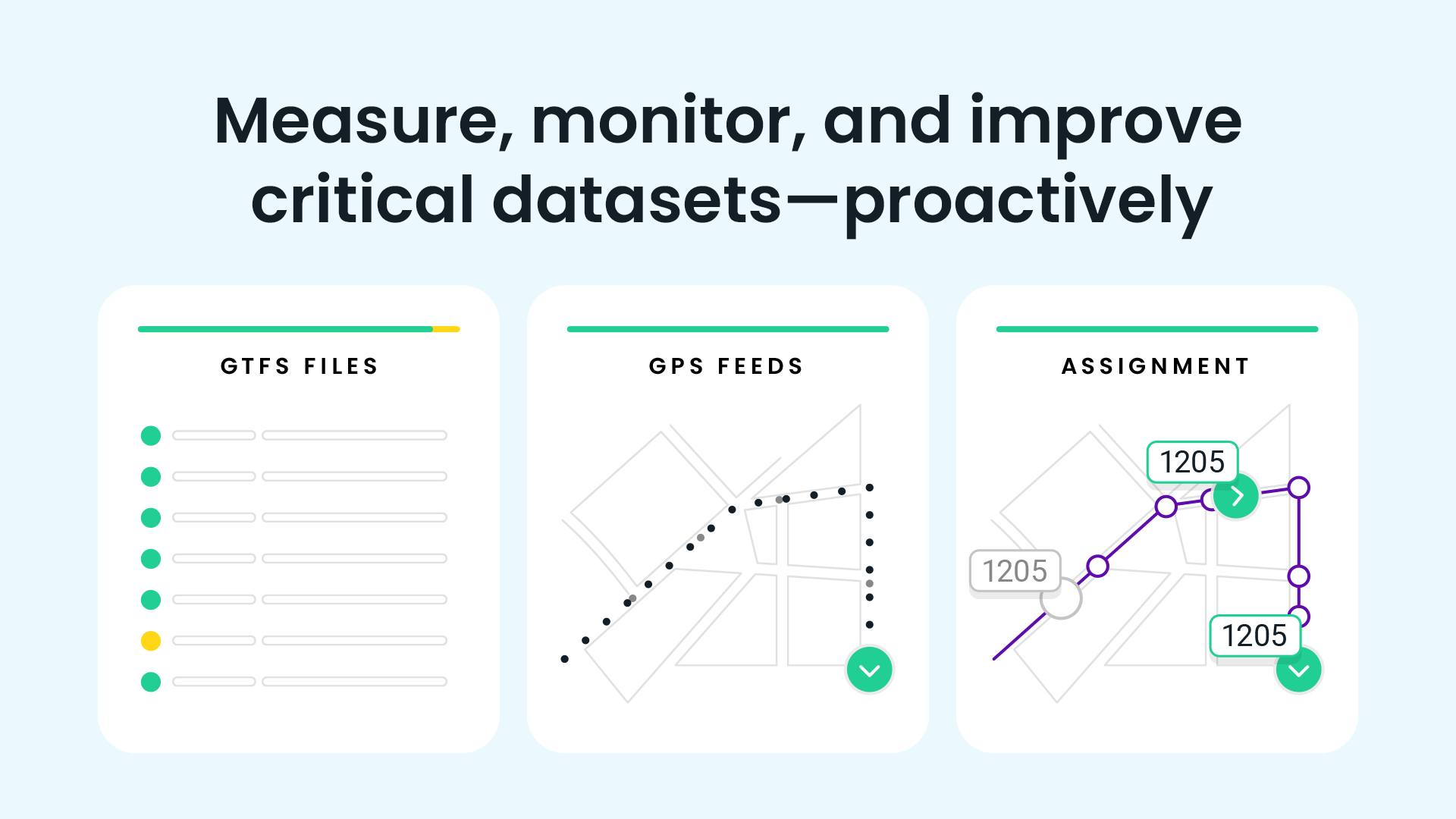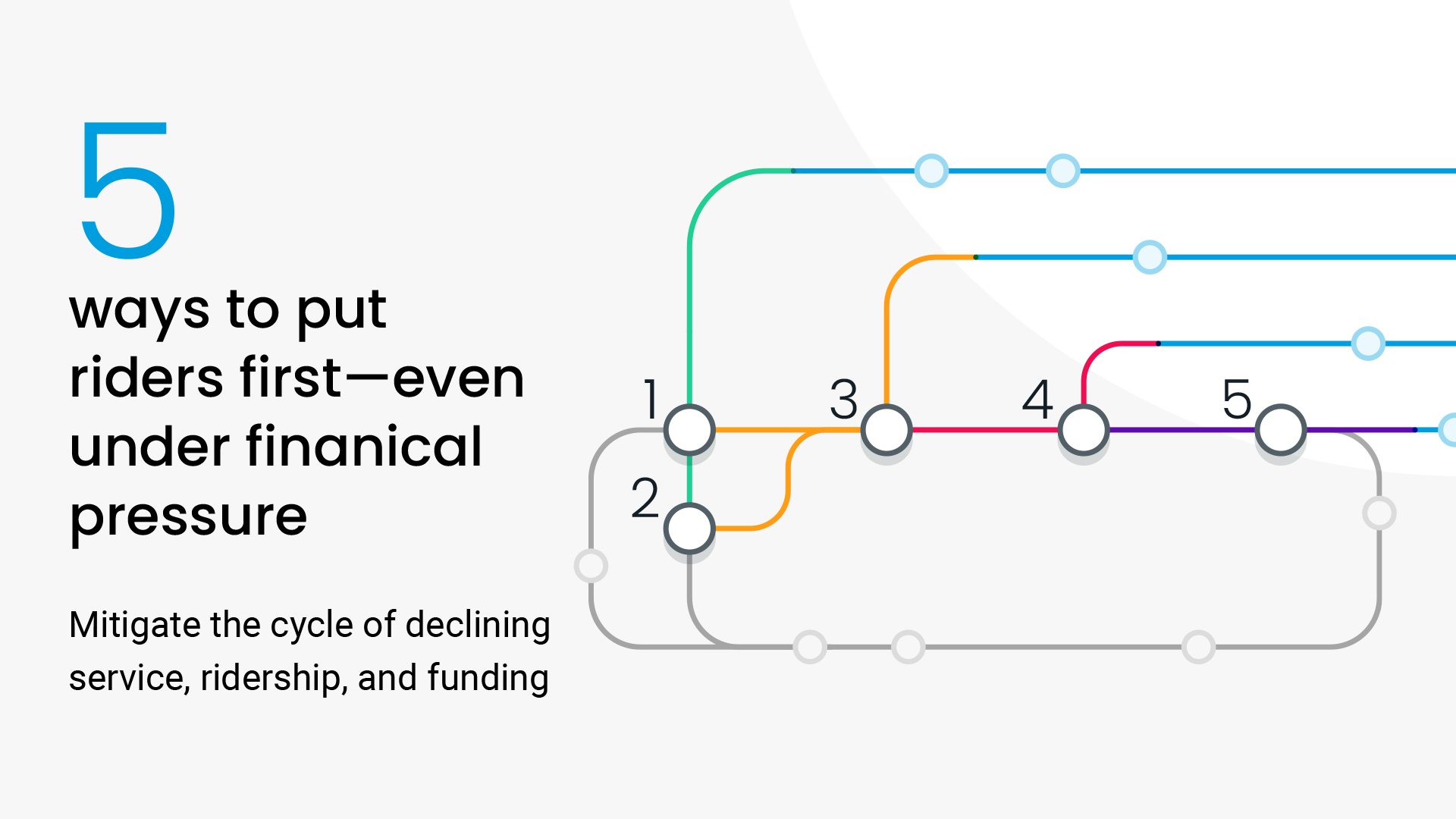
September 28, 2020
How the MBTA Is Using Swiftly APIs to Expand their Operations Toolkit

September 28, 2020
How the MBTA Is Using Swiftly APIs to Expand their Operations Toolkit
September 28, 2020
How the MBTA Is Using Swiftly APIs to Expand their Operations Toolkit
Executive Summary
For years, the MBTA’s dispatch software was slow, inflexible, and focused on the desktop, with limited ability to integrate with other platforms for staff in the field, impacting the effectiveness of bus inspectors and eroding the rider experience. To fix the problem, MBTA built Skate, a tool developed in-house that enables bus inspectors to monitor the status of scheduled bus service out in the field, in real-time. Swiftly’s open APIs allowed the MBTA team to build Skate in only three months and avoid expensive, rigid vendors in the process. Since deploying, eighty percent of bus inspectors have adopted Skate, redefining how the MBTA interacts with their riders.
By the numbers
- MBTA delivers service to over 1.23 million passengers daily
- Skate was built in just 3 months
Rigid vendors holding back MBTA operations
The MBTA is one of the oldest and most respected transit systems in the country, but even their operations team faces a common transit enemy: bulky software from expensive, rigid vendors.
Bus inspectors, the front lines of providing MBTA’s exceptional passenger experience, make bus service happen — as reliably as possible. But until recently, bus inspectors, in particular, were hurt by cumbersome systems that hindered their jobs as often as it helped them. “We use a lot of monolithic software,” says Logan Nash, Deputy Director of Realtime Applications at MBTA. “The software is powerful, but getting any sort of actionable data out of it is very difficult. It’s hard to pull the data out, transform it, or put it in a different tool. And writing data into it is impossible.”
This left bus inspectors frequently resorting to pen, paper, and MBTA’s decades-old portable computers to do their jobs, which left them essentially blind to the whereabouts of the bus fleet, creating a subpar rider experience in the process.

“If we wanted to use the legacy system to put data in a format that was easy for our bus inspectors to understand, we either couldn’t, or it was very, very challenging,” Nash says.
“This meant that passengers would approach MBTA officials in uniform to ask when the next bus would arrive, and the inspector would just have to look at the printed schedule and hope for the best,” Nash explains. “It was a bad look when vehicles were running behind schedule.”
The MBTA knew they could fix the issues with the right tool — with software that was integrated, modular, and best in class. Unfortunately for the MBTA, the out-of-the-box solutions available would lock the team into a long, inflexible vendor contract. What’s worse, vendors told Nash that the MBTA would have to swap out their entire CAD/AVL system in order to use their solutions — forcing the agency to replace the hardware on all 1,000 MBTA buses.
That wasn’t good enough for the MBTA’s Customer Technology Team, a software development group within the agency, so they went to the drawing board to weigh their options.
Skate, a custom tool built in under three months
The MBTA’s Customer Technology team realized that they could build their own custom tool using Swifty's open API. Swiftly has been the MBTA’s real-time prediction vendor since October of 2018, providing the MBTA with predictions that are up to 30% more accurate than before. MBTA can use Swiftly’s real-time predictions APIs to predict on-time performance, bunching and gapping, and a whole host of other use cases.
The team created Skate, a web-based dispatch tool built on Swiftly APIs, for inspectors to use on Android tablets. And the team managed to do it in just under 3 months — record-breaking speed for any development team, let alone what some might consider the more bureaucratic environment of a public agency. This was largely thanks to the MBTA’s Customer Technology team — a start-up-like group within MBTA aimed at building rider-centric tools based on principles of strong design, quick iteration, and scalability. The team drew heavily on the user-centric approach they honed by designing for passengers as well as the flexible, powerful real-time APIs provided by Swiftly.
“Swiftly APIs are tremendously powerful. It’s the opposite of a monolith blocker. There’s no approval process. We can just take this powerful data and run with it.” —Logan Nash, Deputy Director of Realtime Applications at MBTA
Skate provides immediate value for bus inspectors
Skate has enabled inspectors in the field to monitor scheduled bus service at scale, track shuttles during disruptions to service, and respond to customer inquiries in real-time.
What’s more, even the most tech-averse inspectors have become evangelists for their new tablets. One inspector, a soon-to-be-retiree and power-user of the legacy system surprised Nash and his team, with his praise. Nash recalls: “He said, ‘You’re going to have to take this clunky laptop back! Skate does everything I need. This is awesome.’” The usage metrics show the same; he’s logging in every shift and heavily using Skate throughout.
APIs make Skate open-source for all agencies
Nash knows that it’s unusual for a transit agency to invest in a team of software developers and product managers to create something like Skate, so he aims to share the fruits of the team’s labor with other transit agencies so they can see the same results in their service areas. For this reason, the MBTA decided to make Skate open source, and MBTA is happy to have other transit agencies to use the solutions they built. Just a few months after the MBTA launched Skate, another agency that also uses Swiftly’s real-time APIs is already considering deploying it.
Nash and the MBTA team deeply believe in sharing best practices across transit agencies and have extolled Swiftly’s openness and interoperability in making Skate available at agencies of all sizes.
The shape of things to come
For Nash, Skate is proof that the MBTA can avoid being locked into monolithic software and can create or procure flexible, cloud-based software to improve the rider experience.
Nash is already thinking about how he can use Swiftly’s open API to build tools that directly support bus operators. After all, it’s no secret that existing options for operator communication and other onboard tasks are extremely expensive, take years to deploy, and create vendor lock-in through proprietary hardware. Nash knows there’s a better way.
“I’m always asking myself how we can expand on the same principles of modularity, flexibility, and openness that we established with Skate. The way I see it, the trick is to work with really smart vendors like Swiftly whose open ecosystems will retool our entire real time transit architecture for the better. I’m confident that this kind of openness will transform the rider experience for all of transit.” —Logan Nash, Deputy Director of Realtime Applications at MBTA
Interested in seeing how Swiftly APIs could work at your agency? Reach out to see a demo today.
Request a demo
The rich text element allows you to create and format headings, paragraphs, blockquotes, images, and video all in one place instead of having to add and format them individually. Just double-click and easily create content.
Last Name, Agency

What’s a Rich Text element?
What’s a Rich Text element?
What’s a Rich Text element?
What’s a Rich Text element?
What’s a Rich Text element?
The rich text element allows you to create and format headings, paragraphs, blockquotes, images, and video all in one place instead of having to add and format them individually. Just double-click and easily create content.
Last Name, Agency
Static and dynamic content editing
A rich text element can be used with static or dynamic content. For static content, just drop it into any page and begin editing. For dynamic content, add a rich text field to any collection and then connect a rich text element to that field in the settings panel. Voila!
How to customize formatting for each rich text
Headings, paragraphs, blockquotes, figures, images, and figure captions can all be styled after a class is added to the rich text element using the "When inside of" nested selector system.
- text goes here
- text goes here
- text goes here
- text goes here
- text goes here
- text goes here










